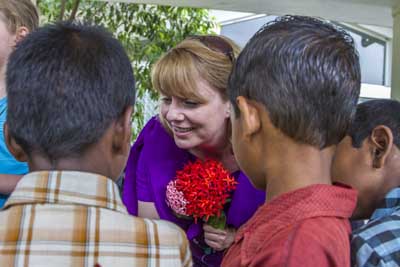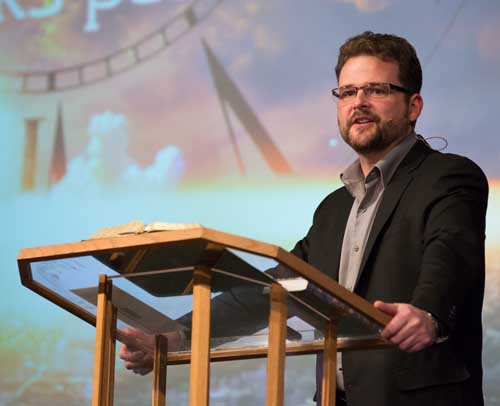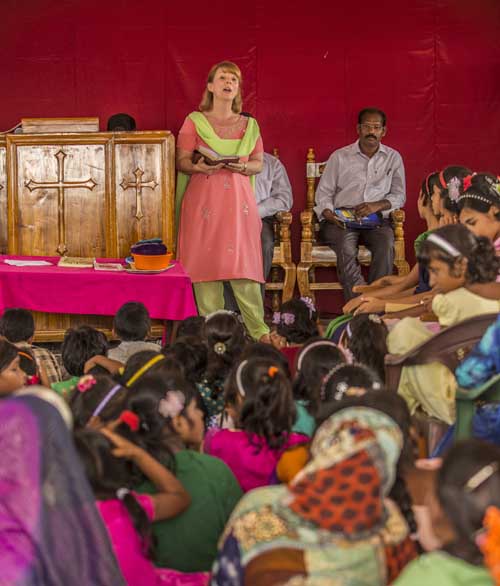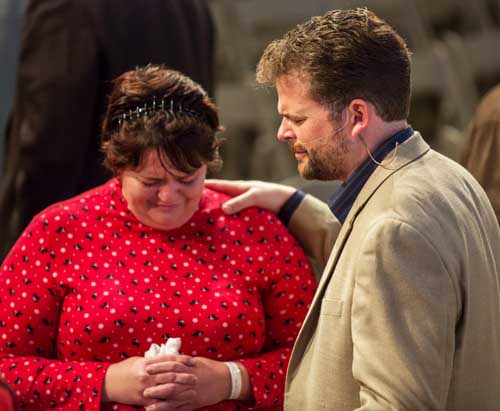
Adventist
Review editor Bill Knott recently sat
down with Shawn and Jean Boonstra, the husband-and-wife team now leading the
Voice of Prophecy, to talk about the how Adventism’s oldest media ministry is
winning new audiences.
KNOTT: You’ve been chosen to lead one of the most
revered ministries in Adventism, one that’s emotionally closer to more
Adventists than almost any other. But that revered name clearly needs an update
for a generation that’s not content to simply remember their grandparents’
commitments. How will you bridge that generational divide—and the technological
divide that has moved radio from the forefront of popular media to one among
many media options?
SHAWN:
That’s a giant question! Even though VOP launched in 1929—85 years ago—I don’t
believe for a moment that it has outlived its usefulness—not if we go back to
the core values that made this ministry so valuable in the first place.H.M.S. Richards understood the value of mass
media (radio at the time) to deliver the Three Angels’ Messages behind the doors
of people who might not be reached in any other way.The task he was trying to accomplish is by no
means finished.There may have been some
important shifts in the way that people use technology, but the task isn’t
finished.People today have more access
to media, not less.That’s the thought
that drives me:Find what your audience is paying attention to, and get in on it.
I may
have worked mostly in television up until a few years ago, but I’ve really been
a radio person all of my life. From the time I was 7 years old, I had a
transistor radio by my bed.It had a
little braided cord earpiece, and as a kid, I would listen all night to the AM
stations that would bounce into northern Canada at night, particularly in the
winter.I still have a Grundig shortwave
radio on my nightstand today.Shortwave
was the Internet of 1910—the method tens of millions of people used to learn
about the world around them. The ways people use radio have certainly shifted.We don’t all gather around the radio in the
living room every evening as our parents and grandparents used to, but if
anything, it’s moved into other and even more important arenas of our lives—in
the car while we’re commuting; in the garage when we’re tinkering on a Sunday
afternoon, on the job work via our headphones in our soulless work cubicles. So
even as technology changes at an incredible pace, radio’s total impact on our
lives has actually increased.
With all the change swirling
through media ministries today, what stays the recognizable about VOP?
SHAWN: Building a bridge to the future means adapting to changing technology, but rest
assured it, also means keeping the core values and principles that made this
ministry so vital in the first place. There are still people to reach—hundreds of millions of people—and those
people consume more media than ever before.This ministry is about taking God’s last-day message to the world, to
the general public, in a way they understand, in a format they understand, and
using all available technology that they use.

So what
will we be doing? Well, to start with,
we’ll maintain a strong and vibrant radio ministry. I’m already doing a weekly
broadcast, the traditional pre-recorded broadcast that listeners have loved for
decades. We build from that.But as we move forward over the next few
years, you’re going to see the VOP going in a number of new directions.
Media
today is undergoing a convergence. Television and Internet have already begun
converging: many people today have a smart TV, a Roku box or an Apple TV.Internet and television have blended to the
point where a huge proportion of younger consumers no longer subscribe to cable
or satellite TV. They’ve cut the cord.
Other
convergences are bursting with opportunity.Eventually, you’re going to see video, audio, and Internet all merge in
a way that also makes them interactive, providing real-time response from those
watching, listening, and experiencing our content. As a media minister, I can
get data back from the audience. For the first time, I can know what they’re
thinking and how they’re consuming media.It’s no longer one-way communication. Today, it’s not only possible to
know exactly how many people listened to the broadcast, but we can know in
great detail what topics piqued their interest. We can access data that tells us when we managed to scratch the
listener’s itch, so to speak.Over time,
we can fine-tune the content we provide in such a way that it actually gets the
Three Angels’ Messages across to people in a context that is tailored by their
own preferences.
How would I experience what you’re
talking about?
SHAWN: If I begin to notice that Bill Knott always
clicks on anything that has to do with English literature—if he always clicks
when I mention Shakespeare or Lord Tennyson—then I can begin to funnel more of
that content in his direction.I can
tailor the product to meet your personality, to include material that you enjoy
listening to. I don’t want to be too “Big Brother,” but if Google and Amazon
can tailor content for your taste, I want to do that too. That’s important because God has been working
with an individual for years before
they come across the content I provide.It’s far more effective to figure out where God has been working in your
life—the areas He’s been speaking to you about—and tap into those than it is to
try and make you interested in what I
have to say. The Bible is clear: I don’t
actually have the ability to make you interested in spiritual matters.I don’t have the ability to “tune you in,” so
to speak.But God does, and if I observe
you long enough, and I can discern where God is speaking to your heart, then I
can join the conversation at that
point.I can show you God’s plan for you
and for His church in these last days.
You appear to
be envisioning a much different relationship between the person who listens to
VOP and the assumed passive listener of radio lore. When do you anticipate some of these
developments might come about?
I’m almost hesitant to talk about
everything that is possible, because we’re just getting started, and we’re dreaming right now. We’ve just
taken over in the last year, and we have a lot of rebuilding to do. We’re also
in the middle of moving the ministry. So the stuff I’m talking about—it’s going
to take a little time.I don’t want people to get the idea that
they’re
going to see this all fall into place over the next few months, because this is
going to take some time and effort. You’ll see us implement some of these
things over the next five years. And some of it doesn’t
exist anywhere in religious broadcasting, so we
have to build it–dream it–from the ground up.
My
understanding of The Voice of Prophecy ministry is that it was built from 1929 forward on the foundation of a
largely Christianized, more or less biblically literate culture that understood
the notion of the Second Coming, that understood the frame of apocalyptic
prophecy as part of the biblical message. You often talk about reaching an
unchurched generation—reaching a secular generation that doesn’t come to the table with any of
that background. How are you going to keep your core audience that’s been with VOP for decades while
also reaching out to that unchurched, biblically illiterate, or less literate,
audience?

We sometimes
make the mistake, in my humble opinion, of thinking that the way to reach a
secular audience is with a secular presentation. While I believe you have to
speak a language that people understand, I disagree with the assertion that we
need secular content to reach secular people. If you read what Paul writes, he says,
“Spiritual things are spiritually
discerned.” It is impossible for me to interest a person in Christ
if she is actually, purely, 100 percent secular. I just don’t have the ability
to make that person interested in spiritual things.Paul is crystal clear about that in his first
letter to the Corinthians: “… the natural
man does not receive the things of the Spirit of God, for they are foolishness
to him; nor can he know them, because they are spiritually discerned.”
I have no
ability to suddenly make a truly secular person interested in spiritual
things.It’s just not possible. However, I
also don’t
believe there are very many truly secular people out there. They may not have had
the same exposure to Christianity that their grandparents did, but very few people are genuinely
secular. Even some of the more rabid neo-atheists give their hand away
occasionally; they’re not as secular as they’d like people to think.
And North
America is far from being a non-spiritual society.People may be less into organized religion
than they were a few decades ago, but they are still spiritually inclined.Dramatically so, in fact.And we shouldn’t forget the fact that even
over the last 150 years or so, the popularity of biblical Christianity has
waxed and waned a number of times.Revivals happen with noted regularity.
Now, is
Christianity in America currently in decline? No question about it.Fewer people go to church. My own generation
isn’t as dedicated to church-going as my parents’ or
grandparents’ generation.
But it’s far from over.I came across an
interesting statistic the other day: when New Hampshire ratified the American
Constitution in 1789, something like 17 percent of Americans attended church.
Today the number is still around 34 percent–double what it was at the birth of
the American republic.So in reality, we’re still ahead of
where we used to be.
Of course,
people are not as conversant in the details of Christianity as they used to
be.They don’t spend a lot of time
talking about historicism versus futurism, at least when you’re talking about
Joe Six Pack.But for that matter,
people aren’t as conversant in topics such as history or politics, either.
So we have to
start where people are. But that doesn’t
mean you have to start with a secular discussion. Watch the content that secular stations put
out with surprising regularity: the History Channel and other documentary
outlets almost seem to feature more apocalyptic material than religious
stations do.Will the world end in
2012?Will we be wiped out by an
asteroid?Is an alien invasion really
possible?You know: the kind of stuff we
have answers for!
We have to
start where people are, but we don’t have to start with a secular discussion.
I’m still always surprised how Daniel 2 has the ability to arrest the attention
of the most relativistic, postmodern mind!After hearing it, they might still disagree with me. They might still dislike
me on their way out the door. But most
of them will be back, because they can no longer say for certain that there is
no God. Now they have to consider the
possibility, because Daniel 2 is hard to explain away.
So, unlike
some Adventist critics in recent years who have talked about abandoning the
landmark prophetic topics of our past to reach a new generation, you’re saying
that apparently secular, unchurched, biblically illiterate people will respond
to the great foundational truths we’ve always preached?
It absolutely
works.I’ve proven it again and again,
in some of the toughest cities on the planet. Daniel 2 is like a bucket of
cold water over the head of the professed secular person. We often talk about how the world
is secular, postmodern, but we make a huge mistake when we assume that
people are happy in that condition. Nobody’s happy with uncertainty and
disillusionment.

The
core issues that speak to the human heart have never changed.We all become aware at some point in our lives that we’re going to die. And we all,
generally speaking, we all feel cheated when it dawns on us that wedon’t have time in life to do
everything we want to do.We feel
cheated when we realize that we’re not going to be good at everything we’d like
to be good at, and we don’t have time to experience everything we’d like to
experience. Our bodies start falling
apart before we can do all the things we’d like to do.
And even
though we know, logically speaking, that death is coming for all of us, we
still fight it.We still scream when we
get there—“There’s something wrong with this!” It’s what Solomon says in
Ecclesiastes 3:11: God has put eternity
in the human heart.
No matter who
you are or what your background is, you’re likely going to struggle with this.
You can go to any culture, any civilization on earth, and they have rituals
that to help them cope with the idea that they’re going to die. Or they’ve
developed a mythology that somehow mitigates or dismisses the reality of death.
They have something that tries to assuage the pain.
That’s common to all human
beings.
Guilt is another one.I don’t care how much we try to build structures and
coping mechanisms in society to help us to dismiss feelings of guilt, we all
have this intrinsic feeling that something is wrong with us. Just look at Greek
mythology. Before you get to end of the story, what do you discover in the
protagonist’s life? A tragic flaw that prevents him from getting what he wants
or becoming what he wants to be. That’s because all human beings have this sense that
there’s
something wrong with the human race.
In Christian
thinking, the problem is sin.That subject is anything but irrelevant, because people still sense it: there
IS something wrong. There’s something wrong with MY heart, with my neighbor’s
heart, with everybody.What is it?
We may have to
back up to very foundational issues with this generation, but this idea that
people are not religiously inclined?Nonsense. Human beings are struggling with the same things we’ve struggled with for thousands of
years. The core human problems never change.
You’re not only reinventing a ministry
with a great variety of new media outlets, but you’re also relocating it. Tell me
about the process of choosing a place to locate the ministry headquarters after
a long history of VOP as a southern California ministry. How are you going to make
it work?
It’s true: we
have to move. The Adventist Media Center
in California is closing its doors: we had to find a new home. So we prayed about it.We ended up visiting 11 communities, and
there were a lot of exciting possibilities. A number of individuals and organizations asked us to come and look at
what they had to offer, and I was overwhelmed by the generous support and
positive attitude that people had for The Voice of Prophecy.

But there were
several things about Loveland, Colorado that kept it at the top of the
list. The cost of living, its central
location, the quality of life–these factors made it very attractive. The cost of living is such that our operating
expenses can drop significantly without affecting the quality of life for our
employees.In fact, the quality of life
is likely to improve, and we can redirect those same cost-of-living
funds directly into the evangelistic efforts of the ministry.We’re talking many hundreds of thousands of
dollars saved for the work each year.
And when
you’re a self-funded ministry, that’s a big deal.
As it turns out, the most traditional
location for The Voice of Prophecy proves to be Loveland,
Colorado.This is something I wasn’t really aware of
until after the decision was made to go to Loveland. Campion Academy is where
H.M.S. Richards went to school. He was their first graduate—and the commencement
speaker the next year! He was baptized in Lake Loveland. So really, even though
VOP has been in California for 85 years, in some ways, we’re bringing the ministry home.
JEAN: Not only does this ministry
have deep roots in Colorado, but the lifestyle is very attractive to our team.
We really hope that those who work with us have the opportunity to live in a
great environment to raise their families. And our new location is very
central, as Shawn mentioned, to get to different places throughout the country,
to visit far-flung families, to participate in a wide range of events and
occasions. And we’ve
had tremendous support from our longtime partners in California. They
understand the reasons for our move, and they’ve been very supportive, very
happy for our future.
In previous
experiences with media ministries, Jean, you’ve led initiatives that worked on
developing child and youth audiences. Do you expect that to be part of your
future at VOP?
Yes,
definitely. In the near future? Probably not, just because of the many tasks
that are involved in transitioning the ministry to Colorado, and some of the
new outreach efforts. But certainly, we want to reach out to the whole family.
Kids and youth are extremely vital to our mission. And the Discover Bible School
has originated some things for kids that we plan to continue to develop—to
create new digital formats. So yes, you’ll see that happen in the next few
years.
I want to follow
up on the description that VOP is largely self-funded. Give me some sense of
the sums, if you can, that need to be raised annually from friends of this
ministry in order for you to run the viable program you’re describing.
Maybe it would
help to describe what it is that we’re funding, and then tell you what that costs. One thing
that we’re
not going to do as we move into the future is to function as some sort
of spectator sport. My conviction is
that my job is not to ask people to support my ministry; I’m doing this to support the
ministry of individual church members in their outreach.
What
I want to do with The Voice of Prophecy is help raise everybody’s courage.

We have the
right message; we have the right methods; we have everything we need as a
people, except (in many cases) for courage.I want church members to understand that God can use them to lead
someone to Christ.
I’ll be demonstrating possibilities
in the broadcast and media production. I’ll be demonstrating possibilities
in our large urban evangelistic efforts. But more importantly, we’re going to start training and
resourcing local churches in a way that enables them to be The Voice of
Prophecy in their communities–so that local church members can do in their
communities what we’re doing on the air and in major urban centers. So it’s not just, “Hey, Listen to what Shawn and Jean are saying on the radio.” It’s not just, “Look at the campaign they held at such-and-such a city.” This is
about God’s whole church doing this together.
I’m committed
to putting The Voice of Prophecy and its resources at the disposal of the
entire church. This is your ministry, not mine.And I want everyone to enjoy the kind of success in their corner of the
field that we’ve
been enjoying in ours. God has given me the opportunity over the years to enjoy
driving the Cadillacs of church ministry.I’ve worked for It Is Written
Canada: I’ve
worked for It Is Written International.Now again, with The Voice of Prophecy, I’ve been handed another Cadillac.
I wish every
church member could drive a Cadillac! So that’s what I want to do.I want to teach our members how to find
phenomenal interests in the community; how to get those people through the
doors of the church; how to share what we believe; how to ask people to join
the church; and how to incorporate those new folks into the life of the
church.
I
want our church members to enjoy living an evangelistic lifestyle.I want them to see people respond to
our message.I want them to see just how
powerful it is.
So we will be
engaging in major urban evangelism. That does cost something. Every time you
take on a major city, you’re investing something like half a million dollars. The
investment is well worth it because it’s not a one-time thing, a brief
event, if you do it right. Ideally, it’s a three-year relationship with the
churches in a city that leaves behind church members excited about doing this
themselves.
If you do it
right, you’ll never have to return to the city, because the church members now
know what to do.I’d like to move every
church member past this idea that they need a professional “closer,” a
professional evangelist to come and win the city for them.
What
do we need to start making all of this happen? About six million dollars a year. That would bring us
back to what we used to be—or at least, it would be a good start.It would include new methods of interactive
media outreach, major urban evangelism, equipping and resourcing churches, and
of course, a number of humanitarian outreach projects each year.
In recent
years, the ministry has fallen on hard times, but we’re already seeing dramatic
evidence that God is turning it around.When we hit about $6 million, we’ll be on our way to returning this
ministry to the powerhouse it once was.
How do you
go about raising $6 million a year? Does that happen through sponsorship experiences,
or letter-writing campaigns? Tell me how you plan to do it.
JEAN: We held our first annual event in Palm Springs last
December, and had a wonderful response from our friends there in the Palm
Springs area—listeners who have been very supportive of VOP over the years. But
we’ve decided to
create this new sponsorship program because it’s really a team effort. Our
sponsors are the lifeline of this ministry, and nothing happens without them as
a part of it. Our sponsors really are an extended part of the family. So this
coming fall [2014] we’ll meet three times—three different weekends—throughout the country to
share, to dream together. And every month we also publish a letter that we send
to homes.We call it our monthly appeal
letter, and, for example, after Shawn finished his recent evangelistic series
in Indianapolis, we focused on telling the stories of what happened there,
sharing those with our sponsors, with our community. We want to give people the
best opportunity to participate in effective evangelism. The letters present
opportunities to participate, and they give us an opportunity to demonstrate
that the investment is working.
It’s not a one-time event, as Shawn
said. We’re
going to reach out now to Minneapolis, and potentially, Seattle.
So you’ve already got several major urban
areas in focus?
SHAWN: We’re already booked out on major urban outreach several
years in advance. We’re in Minneapolis in February [2015]. We’re looking at Seattle in 2016. I’m particularly excited about that
one, because the Pacific Northwest is traditionally a tough place to
evangelize.People say it can’t be done there. I happen to know
it can be done there, because that’s where I cut my teeth on
evangelism.
All the
changes that have you’ve described must be having a major impact, Shawn and
Jean, on you and your family. Many supporters are very interested to know how your
family is doing with all the moving and the adjustments. What’s life like right now?
SHAWN: This is, I believe, my 23rd or 24th
lifetime move. Moving is old hat for me. Jean and I have been married just over
20 years, and we’ve moved ten times.Some of those moves have been
across town, but many have been major moves. And while moves are always
stressful, we’ve come to trust God. And our kids?It has been tough on them.But they’ve known for about a year now that
we’re leaving
Maryland, and they’re perfectly happy with the decision. They’re all geared up to go to Campion
Academy.
JEAN: They’re actually excited!
SHAWN: We’ve always been a ministry family.
The kids aren’t
just spectators to what Mom and Dad do. They participate wherever they can. I
just took my youngest to Australia with me for an event. Jean took both girls to India because we
partnered with Asian Aid, and they went to open a slum school and to meet a
woman The Voice of Prophecy is going to support in saving girls from
prostitution. So the kids are involved; this is a lifestyle for all of us.
Is it easy?
No, nobody likes moving. On the list of
life’s stressors, it’s always up there near death, unemployment and divorce.We’re in the middle of packing right now, and
we actually don’t
have a home to go to in Colorado. We’ll be living out of our car for a while,
which we’ve
done a number of times, and it always works out. God always has something in
mind.And our permanent home? That will come in the kingdom!
I hope you
have something in Loveland before then, too!